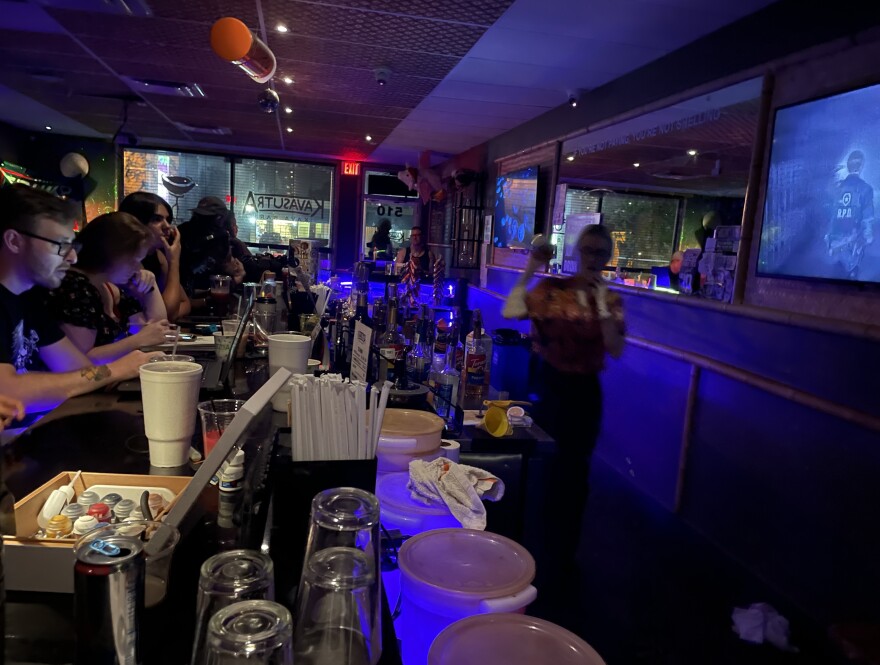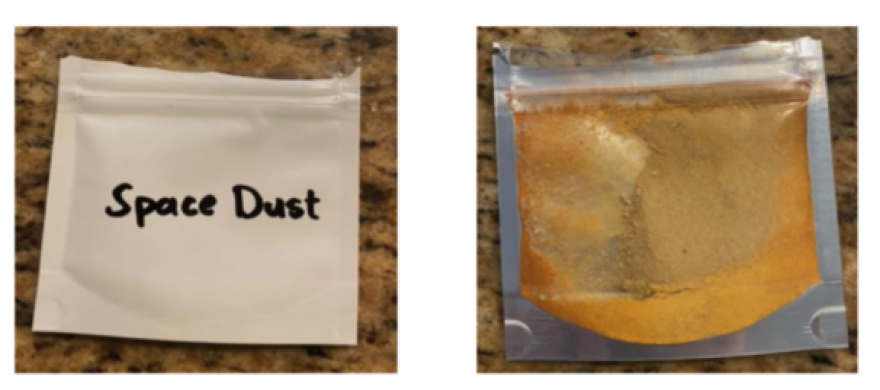Updated July 24, 2023 at 8:22 AM ET
Kavasutra is a dimly lit bar in Lantana, Florida, with a rotating cast of characters: the magician, the repo man, the metalhead picking Slipknot on his unplugged Stratocaster. On a recent Friday night, there's about a dozen other patrons drinking, flirting, swiping at their phones.
What's not here is booze. The bar serves only nonalcoholic botanical drinks. And tonight, like most nights, one drink is clearly winning out: jumbo plastic cups filled with icy kratom tea.
Kavasutra is among thousands of U.S. businesses that sell kratom, an herbal supplement that's spurring debate in statehouses and courtrooms nationwide over how it should be classified and regulated.
And there are dozens of wrongful death lawsuits that have been filed over the product and how it is marketed. Last week, a jury in Washington state awarded a $2.5 million verdict in the first kratom wrongful death trial in the U.S.

A Southeast Asian folk medicine used widely in the U.S.
Kratom is derived from the dried leaves of a tree in the coffee family. It's native to Southeast Asia, where it's been used for centuries as a folk medicine. Millions of American users pick it up at gas stations, vape shops, bars or online.
Ash Turner, one of Kavasutra's patrons, has been drinking kratom tea for around six years. He says the community at the botanical bars is really inclusive and that it's helped bring him out of his shell.
"It relaxes you," says Turner, 30, as he holds a cup of red tea the size of a football. "I feel like being more social and open to these cool conversations."

Lit up by the red glow from his laptop screen, Niko Westley, 30, says the herb helps elevate his gaming skills. "I feel more focused," he says, stabbing a digital stake through a vampire's heart on his computer. "I'm more on point."
In low doses, kratom acts as a stimulant and a social lubricant that can help relieve aches and pains, depression and anxiety, and symptoms of opioid withdrawal. At higher doses, it can produce a euphoric state much like an opioid does — and has been linked to addiction, seizures and death.

Behind the bar, Carlee Palermo, 25, keeps the kratom coming. She says she drinks the tea to help with a degenerative condition in her spine: "It completely took away my back pain."
The customers tonight at Kavasutra say they aren't aware of anyone who has been harmed by kratom. Then Palermo spills a little tea: Many of the people who come to the bar are in recovery from substance abuse.
Asked whether kratom helps with that, she says, "One hundred percent. It's done nothing but help anybody that I've seen."
But it hasn't helped everybody.

'I need to tell you that Max is dead'
"When you lose your child, it isn't anything that you've ever prepared for in life. Nothing!" says Cindy Ross of Palm Beach Gardens, Fla.
On Dec. 11, 2021, Ross's 30-year-old son, Max, was about to start a new job as a sous chef. He went to the mall with a friend to get the shoes he needed to work in the kitchen.
A few hours later, Ross got a call from her ex-husband.
"He said, 'Who are you with?' I said, 'I'm with my sisters.' He said, 'I need to tell you that Max is dead,' " Ross says.
Max collapsed while walking home. He'd had a few beers at the mall and, at some point, a significant amount of kratom, possibly as a concentrated extract. The medical examiner determined the combination killed him.
Ross and thousands of other Americans are calling for increased government regulation of kratom — especially for labeling and guidance on how to use it safely.
"You know what? I believe them, that people are taking it and it helps with their pain," Ross says. "I believe it, that it's helping with their anxiety." But she says people need to know: "What's the dosage, and what do you advise them not to interact with?"


Krystal Talavera lived in the next town over, in Boynton Beach. She was 39, a nurse and mother of four. On Father's Day 2021, her fiancé woke up and found her lying face down on the floor, unconscious, according to a lawsuit. Beside her was a cup of coffee and an open packet of powder with the words "Space Dust" scrawled in black marker.
It was a concentrated kratom extract. She'd ordered it off the internet from a company in Idaho. The medical examiner determined acute kratom intoxication was the sole cause of death. In May, a federal judge ordered the vendor to pay more than $4.6 million in damages to Talavera's family.
Atlanta attorney Matt Wetherington doesn't represent the Talavera family, but his firm is partnering on dozens of other similar wrongful death lawsuits that accuse vendors of selling a dangerous product without proper warnings and instructions.
"When you're selling a drug next to Skittles or energy drinks," Wetherington says, "you have no means of knowing that you're dealing with something that is exponentially more dangerous than anything else on the shelf."

What's safe and what isn't?
The U.S. Food and Drug Administration warns Americans not to use kratom, saying it stimulates the same brain receptors as morphine and could be addictive. But the agency doesn't regulate the product or classify it a drug. Rather, as a food. That leaves consumers to guess at the makeup of myriad powders, capsules and concentrates flooding the market, and how to use them safely.
The FDA declined to comment for this story.

"The case in Florida was egregious," says Mac Haddow, a lobbyist with the American Kratom Association. "They had nothing on it. It's called, 'Space Dust!' It's the poster child for why regulations need to be put into effect."
The American Kratom Association says it advocates for the rights of Americans to consume kratom safely and legally. According to the group, kratom is a billion-dollar business in the U.S., with vendors importing more than 2,000 tons of it into the country every month. It's asking for government regulation — so long as kratom is regulated as a legal, over the counter supplement and not as a drug. The association is pushing states and the federal government to pass some version of the Kratom Consumer Protection Act.
About a dozen states now regulate kratom. Five states have banned it.
"It really brings to bear the question in the marketplace: What is safe? What isn't safe?" says Dr. Christopher McCurdy, a medicinal chemist at the University of Florida. He's been studying kratom for nearly two decades, supported by millions in grant funding from the National Institute on Drug Abuse. McCurdy says the plant shows tremendous medicinal potential, interacting with novel combinations of brain receptors.
"It's like a complex symphony orchestra," McCurdy says.
But a fresh leaf plucked and chewed by a farmer in Southeast Asia is vastly different from the concentrated kratom extracts U.S. companies are squeezing out. And McCurdy says there's at least one big reason why there's no usage guidance listed on many kratom products: No one knows what it should be.
"There's just a ton more science that needs to be done," he says.
Peter Haden is a freelance journalist based in Florida.
Copyright 2023 NPR. To see more, visit https://www.npr.org.







